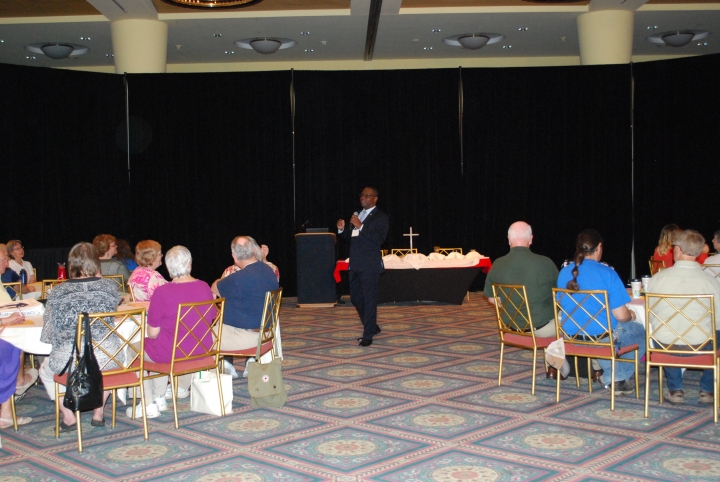news article

The table is set at the AC16 laity session
June 2, 2016 / By Shannon Hodson / .(JavaScript must be enabled to view this email address)
Upper New York Area Resident Bishop Mark J. Webb greeted the crowd at the laity session at the 2016 Annual Conference session by reminding them, “With our movement as United Methodists, the laity has always lead the way.”
Before introducing Conference lay leader Dr. Scott Johnson, Bishop Webb emphasized how important it is for the laity to continue to “lead us in ministry and lead us in how to be the body of Christ … to hold us accountable …to help us to be grounded and rooted to the one we call Jesus.”
Johnson began his sermon by asking the laity to celebrate the fact that the UNY Conference was started seven years ago, that seven years ago the Conference was considered “new.” He reminded the audience that new things eventually drop the “new” and become “things.” A new car will eventually become “the car;” a new suit will eventually become just another thing in the closet; and a new house will eventually become home.
Despite the fact that the Conference is no longer new, Johnson calls for Conference members to not take it for granted.
“We are home and because we are home, the table is set for us to give thanks … for us to celebrate what we have built,” he said. “We didn’t get here by accident … we’re here because God is definitely moving among us … this world is being blessed by members of the Upper New York Conference, in the name of Jesus Christ. We are stronger together than we would have ever have been apart.”
Worship ended with Northern Flow District Superintendent the Rev. Rebekah Sweet and the Rev. Brian Fellows, pastor at the St. Paul’s United Methodist Church in Oneida, who gave brief speeches and led the laity in communion.
After worship, four district lay leaders gave speeches on how to create effective leaders. For example, Cornerstone District Lay Leader Susan Hardy explained that to create successful leaders, we need to first identify them, then develop them, and finally, deploy them.
After the district lay leaders’ speeches, Johnson returned to the microphone, identifying how ministry leaders need to manage change. He described the four areas that these leaders must think about in order to effectively manage change: soul, mind, heart, and strength.
When it comes to the soul, ministry leaders need to be certain that the idea for change is coming from God. When it comes to the mind, leaders must answer the question, “Why do we need to change?” Johnson added that in order to demonstrate the need for change, leaders should stick with the facts.
“Show people something new,” he said. “Data is apolitical. Data makes it hard for people to counteract your suggestion for change.”
When it comes to the heart, Johnson recommends, “let[ting] people be allowed to be upset,” as “the emotion will eventually burn itself out to a point where working through it is possible.” Lastly, when it comes to strength, Johnson advised ministry leaders to clearly explain what needs to be done differently.
As the laity session came to a close, Johnson encouraged everyone to visit the numerous ministry booths throughout the Oncenter that showcase the various outcomes of effective ministry leadership throughout the Conference.